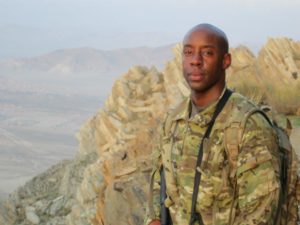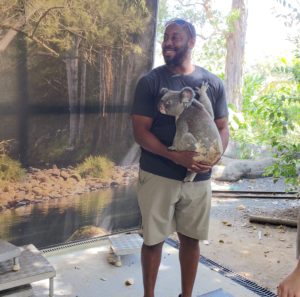BLOG / Behind the Scenes
BTS Behind the Scenes: Meet Darien Hall, Senior Intelligence Analyst
BTS Behind the Scenes is a chance to showcase the people who are making things happen at BTS and give you a “behind the scenes” look into their worlds. In this month’s feature we’ll talk with Senior Intelligence Analyst Darien Hall, and hear his take on career planning, roller coasters, and mentorship.
What are some of your most formative experiences that impacted your professional journey?
One experience that changed me was on one of my first deployments to Haiti during Operation Uphold Democracy. This really gave me an appreciation for being an American. After visiting a 3rd world country, it reminded me that even when I thought I had it bad… it wasn’t that bad. It put life into a different perspective for me. In Afghanistan in 2001 and Iraq in 2003, I experienced much the same thing.
I’ve also been fortunate to have some great mentors, especially at my first duty station at Ft. Bragg, when I was a “young knucklehead.” I had a group of senior non-commissioned officers who sat me down to really help me get my priorities in order. I shaped up after that because I probably would have run myself out of the military if I kept going down that road.
 Why is having a mentor so important at each stage of your career journey?
Why is having a mentor so important at each stage of your career journey?
A mentor is valuable because more times than not, that individual has already been in the position that you are or is in a position that you plan to be in at some point. The mentor can provide guidance that helps you understand the processes and likely minimize, if not eliminate, frustrations. The mentor can also help simplify the growth process and possibly guarantee success. Finally, a good mentor who is oftentimes in a leadership position, will most likely groom an individual to become a good leader themself.
What would you say are the ingredients of a great analyst? What do you have to have in order to be successful in an analyst role?
In my opinion there are a few ingredients required to be a great analyst. One should have a grasp on history, possessing background knowledge of a subject will oftentimes help an analyst understand the topic and help with predictive analysis. The ability to conduct research in a timely and organized fashion is key because there is a lot of information that an analyst comes across and, if they aren’t careful, the analyst will find themselves going down multiple “rabbit holes” and lose focus of what they were searching for. An analyst has to be able to be impartial, so judgement isn’t clouded when making assessments and developing products. Creativity and innovation are two great traits to possess when it comes to product development. Finally, an analyst should be receptive to other analyst’s assessments and opinions as no single analyst always has the right answer and there is often more than one way to view a topic.
Is this something you thought you’d be doing when you were a kid?
Originally as a kid thought I was going to be a lawyer. I always dreamed of having an office in one of the skyscrapers I saw in Downton Tampa. I ended up working at Winn Dixie and realized that it wasn’t going to help me accomplish any goals, so I joined the military, planned on doing that for 4 years and then planned to get out (like so many others). Yet I realized I needed an education (and had just bought a brand-new car) so thought I’d reenlist and stick around a while. I became an NCO and enjoyed becoming an analyst.
If you could go back, what would you say to the 18-year old you?
I would tell myself to play my senior year in football and see if I could make it to the NFL. I’d also tell myself to go into the military with more of a plan. I really went in blind. I went to a recruiter, signed papers, and just went ahead to see what it was all about. Even though I was a military brat it really wasn’t ingrained in me and I had zero plans. With a plan I would have gotten out sooner or gone to an agency or something else in the intel space.
What advice would you give those just starting out in their career?
I would say, if possible, do a job that you enjoy doing… something you want to do. It makes going to work that much more enjoyable. I was talking to a soldier a few weeks ago who was trying to decide whether to stay in or get out – he’s married so he has to do what’s best for him but also his family. So, you have to also ask the question, “What’s going to have job security?” You have to find something that’s going to be around for a while and has that demand. I say always work like your livelihood depends on it.
 Other hobbies and interests outside of work?
Other hobbies and interests outside of work?
Prior to COVID I got into jet skiing. I also play golf and really like to travel, eat out, and try just about anything. I’m a fan of Busch Gardens’ rides, and of course my Tampa Bay Bucs and Lightning. I’ll also go to the shooting range and have started to take up fishing as well.
What’s the best amusement park out there and why?
I should be biased and say Busch Gardens in Tampa, however, the best memories I had as a child was going to Six Flags in Atlanta. I am fortunate to say that I did have the opportunity to ride a few rides at a small amusement park in Vienna in 2019.
Do you have a top travel destination?
My favorite place I’ve ever travelled to was Aruba. I love the water and I love the heart and the people there are just so friendly. It’s one happy island and a really good time.
Tags: darien hall, employee, features
Contact BTS to explore solutions for your intelligence or defense challenges.